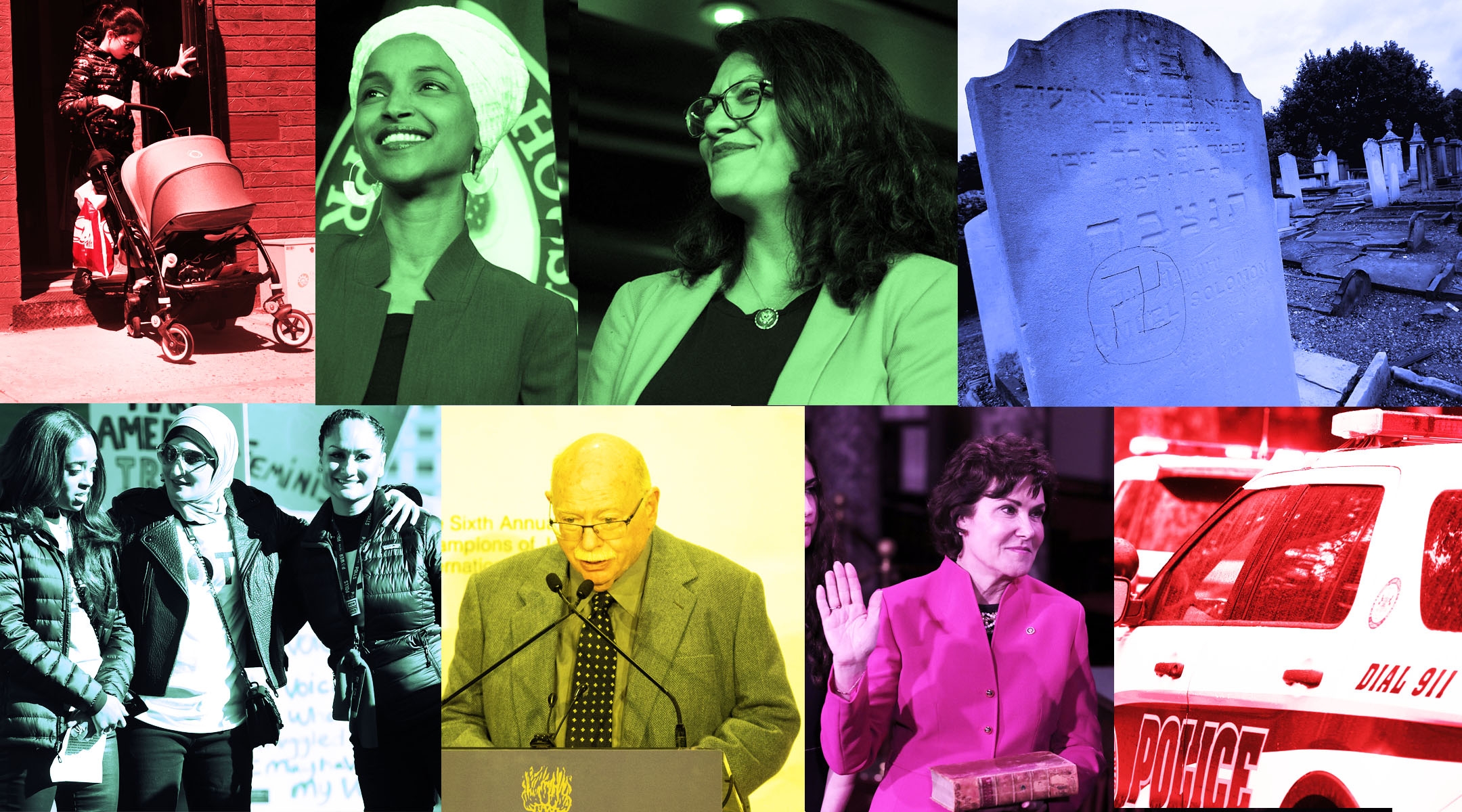(JTA) — The Jewish calendar year 5779 was a turbulent and often painful one for Jews around the world. Mounting global anti-Semitism, two deadly American synagogue shootings and two (as yet) inconclusive Israeli elections in the space of just a few months were among the stories that defined and helped frame the communal discussion as the new year approaches.
These are the Jewish stories that most captured our attention in the year that was and whose ramifications are likely to continue to play out in 5780.
12 Jews killed in synagogues

Police respond to the site of a mass shooting at the Tree of Life synagogue in Pittsburgh, Oct. 27, 2018. (Jeff Swensen/Getty Images)
Mass shootings have become a sad fact of American life, but two this year took deadly aim at this country’s Jews. On Oct. 27, a lone gunman committed the single worst attack on Jews in U.S. history when he opened fire on Pittsburgh’s Tree of Life synagogue on a Shabbat morning, killing 11 worshippers and injuring six. Prior to the attack, that gunman, Robert Bowers, had posted screeds against the Jewish refugee agency HIAS, writing that it liked to “bring invaders in that kill our people.”
Six months later, on April 27, the last day of Passover, a gunman opened fire at a Chabad synagogue in the San Diego suburb of Poway, killing one person and injuring three. The accused gunman, John Earnest, told a 911 dispatcher that he did it because “Jewish people are destroying the white race.”
The attacks deeply shook the American Jewish community, though many took heart from the widespread condemnations emanating from the highest political offices and the expressions of solidarity from the wider community. In the wake of the Pittsburgh shooting, the city’s main daily newspaper, the Pittsburgh Post-Gazette, printed the Jewish mourner’s prayer in Hebrew on its front page.
Jewish Democrats ride the blue wave
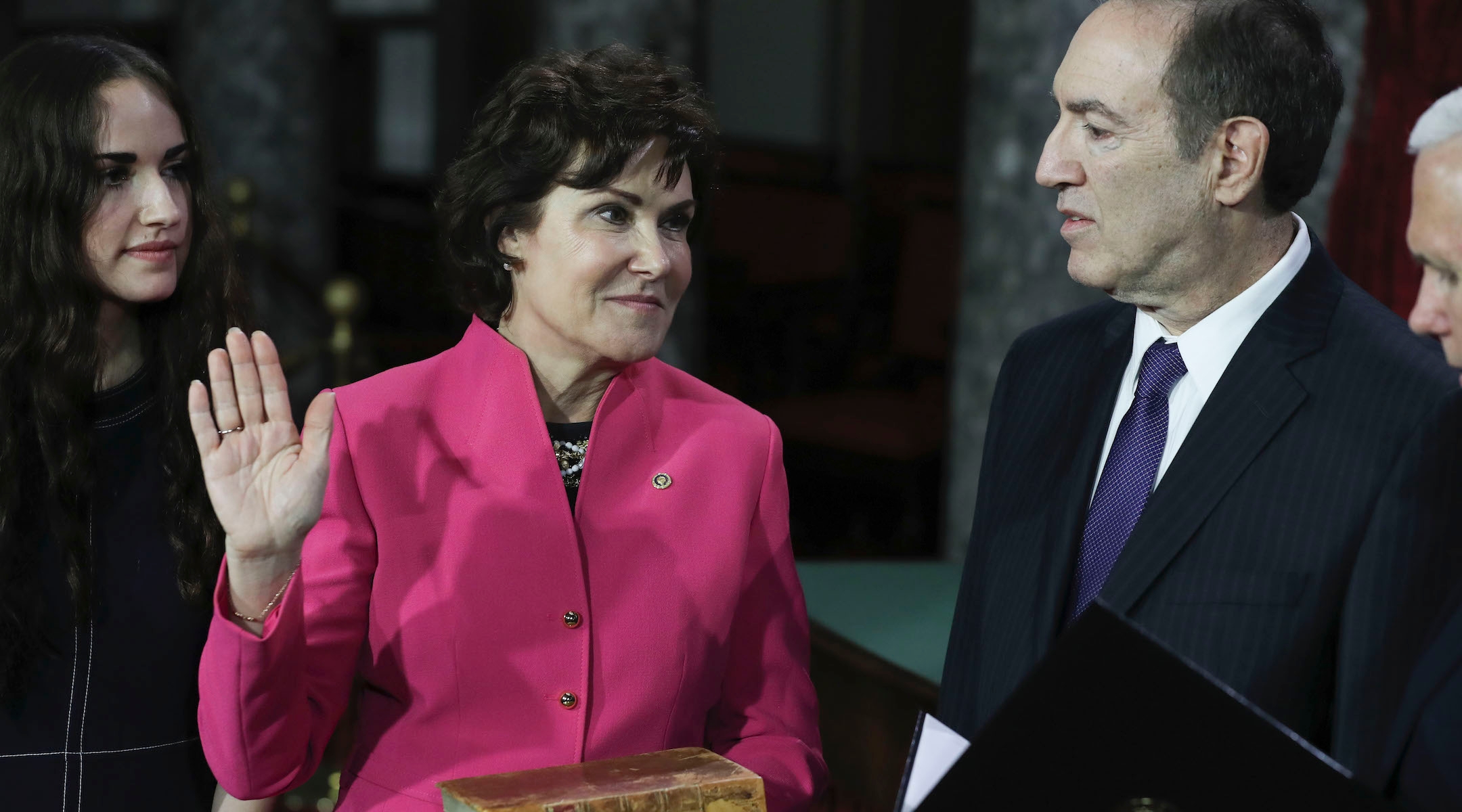
Jacky Rosen, watched by husband Larry and daughter Miranda, is sworn in as a U.S. senator by Vice President Mike Pence, Jan. 3, 2019. (Alex Edelman/AFP/Getty Images)
More than three-quarters of American Jews cast their ballots for Democratic candidates as the party swept to power in the House in midterm congressional elections. Only 19 percent supported the Republicans. Jewish Democrats also figured disproportionately in the party’s upsets: Eight entered the House, two won governorships (Illinois and Colorado) and Jacky Rosen won a Senate seat in Nevada. They also assumed control of powerful House committees that remain at the forefront of major ongoing investigations of the Trump administration: Jerrold Nadler, who chairs the Judiciary Committee, and Adam Schiff, who heads the Intelligence Committee.
Meanwhile, billionaire gaming mogul Sheldon Adelson and his wife, Miriam, became the biggest spenders in American politics, having donated $55 million in an ultimately unsuccessful effort to help Republicans hold the House. The sum represented a substantial increase from the $46.5 million they had donated at the same point in the 2016 election cycle.
Hate crimes against Jews are spiking
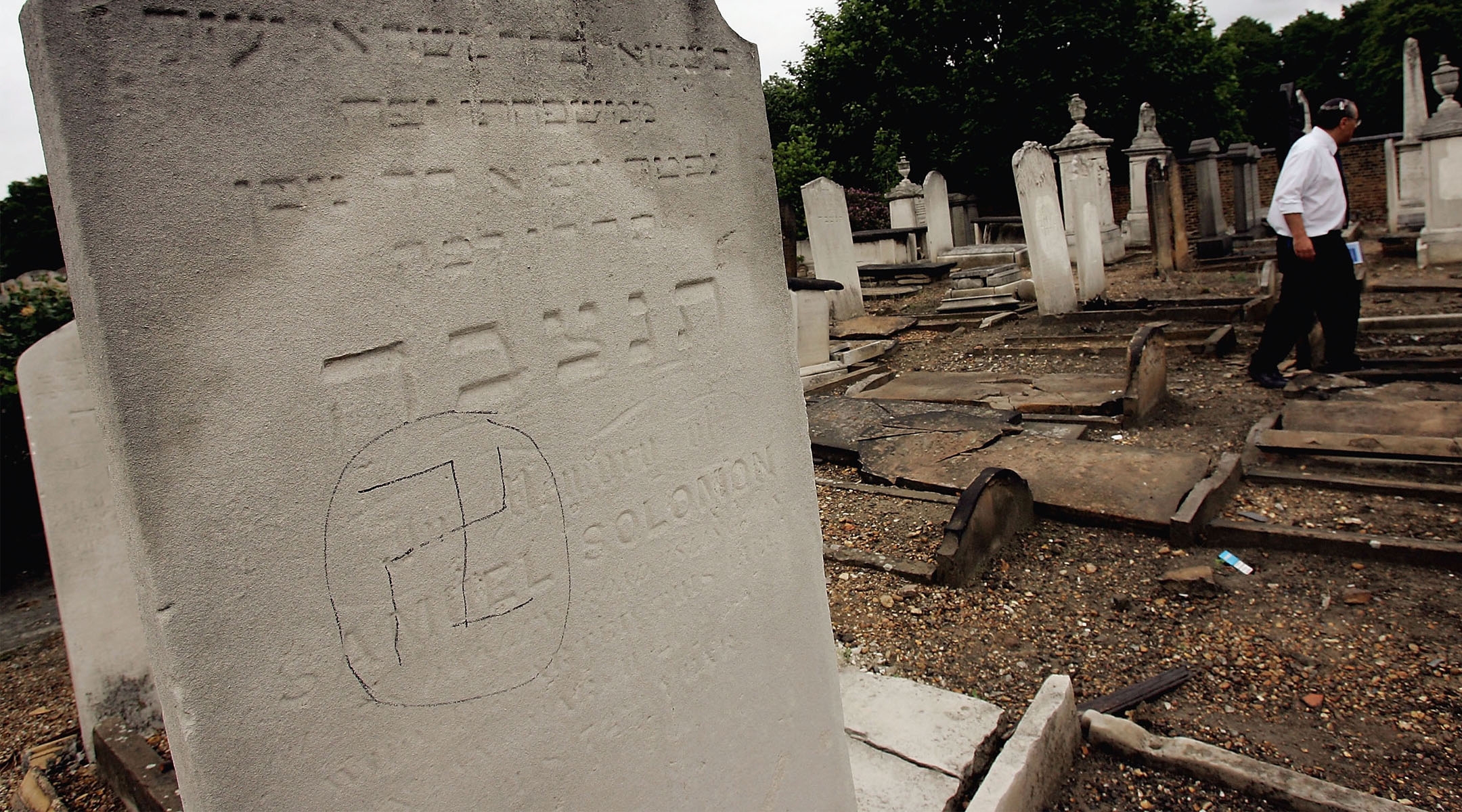
A swastika is daubed on a Jewish gravestone in London’s East Ham Jewish Cemetery. (Graeme Robertson/Getty Images)
In November, the FBI released its tally of hate crimes statistics for the previous year, and the news wasn’t good: The number of hate crimes targeting Jews in the U.S. soared to 938 in 2017, up from 684 the year before. In April, the Anti-Defamation League released its data on anti-Semitic incidents and found the tally for 2018 — 1,879 incidents — was the third highest in the four decades the ADL has been conducting annual audits. Of those, the number of assaults had doubled over the previous year, to 39 from 17.
And it’s not just American Jews. In July, Statistics Canada reported that Jews were the most targeted minority group for hate crimes for the third straight year, though the overall number of attacks declined slightly, to 345 from 360. In France, the volume of anti-Semitic incidents increased by 69 percent in 2018. Over the summer, the British Jewish community’s anti-Semitism watchdog, the Community Security Trust, reported the highest number of anti-Semitic incidents ever for the first six months of 2018. The 892 incidents represented a 10 percent jump over the same period the previous year. In December, a poll of 16,000 Jews in 12 countries conducted by the European Union reported that one in three said they avoid Jewish sites or events out of fear.
The Women’s March remains a lightning rod
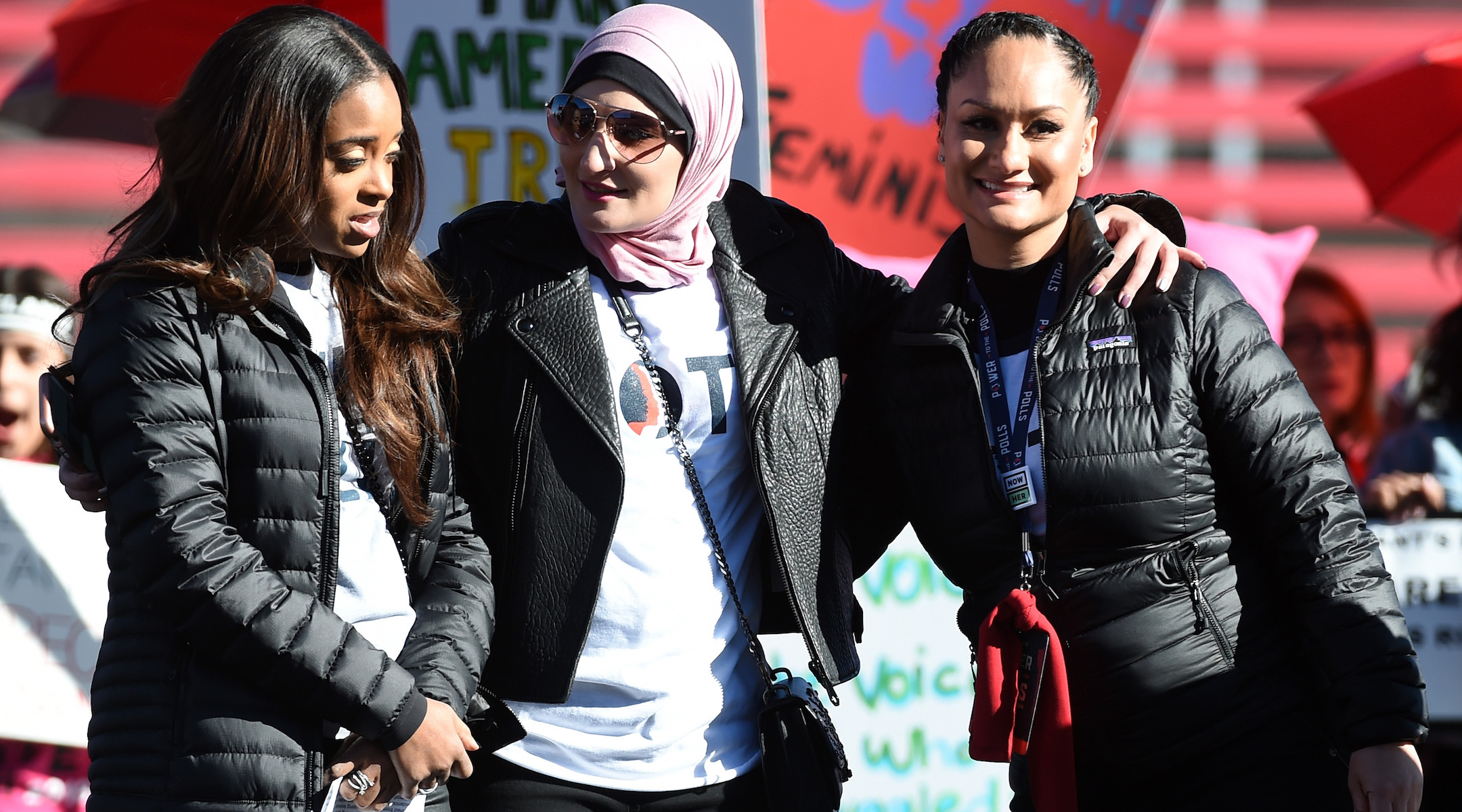
From left to right, Tamika Mallory, Linda Sarsour and Carmen Perez at the Women’s March “Power to the Polls” voter registration tour launch at Sam Boyd Stadium in Las Vegas, Jan. 21, 2018. (Ethan Miller/Getty Images)
In November, Teresa Shook, one of the founders of the Women’s March, called on the movement’s organizers to step down, alleging that they had “allowed anti-Semitism” by refusing to distance themselves “from groups that espouse … racist, hateful beliefs.” One of the founders, Tamika Mallory, has longstanding ties to Nation of Islam leader Louis Farrakhan, who has a history of making incendiary comments about Jews.
Under fire, Palestinian-American activist Linda Sarsour, a member of the march Steering Committee, apologized.
“We should have been faster and clearer in helping people understand our values and our commitment to fighting anti-Semitism,” she said. “We regret that.”
Then in December, Tablet magazine published a piece alleging that Mallory and another organizer, Carmen Perez, had made anti-Semitic statements at two march planning meetings. By the time the march’s third installment rolled around in January, the movement was in disarray, with various Jewish groups cutting ties to the national group and a number of local chapters across the country doing the same.
Sarsour, Mallory and Bob Bland, another movement co-founder, have since left the Women’s March board.
Israelis vote twice and still don’t have a prime minister

From left: Prime Minister Benjamin Netanyahu, President Reuven Rivlin and Blue and White leader Benny Gantz at the memorial ceremony for the late president Shimon Peres at the Mount Herzl cemetery in Jerusalem, Sept. 19, 2019. (Yonatan Sindel/Flash90)
Israel held a national election in April in which Prime Minister Benjamin Netanyahu, facing multiple possible indictments for corruption, wound up in a tie with his principal challenger, Benny Gantz and the new Blue and White party, with 35 seats apiece. But Netanyahu was unable to form a governing coalition, so in September, Israelis voted again. And again, the results — so far as we know them — indicate a very close race, with Gantz perhaps holding the tiniest edge over Netanyahu.
In such a situation, an obvious path forward is a national unity government, though that’s far easier said than done. Blue and White has said it won’t serve in a government with Netanyahu, and Netanyahu, despite the possible indictments still hanging over him, has vowed to hang on. The latest reports are that the parties are in negotiations to form a unity government, but the saga is sure to continue well into 5780.
Israel becomes a wedge issue
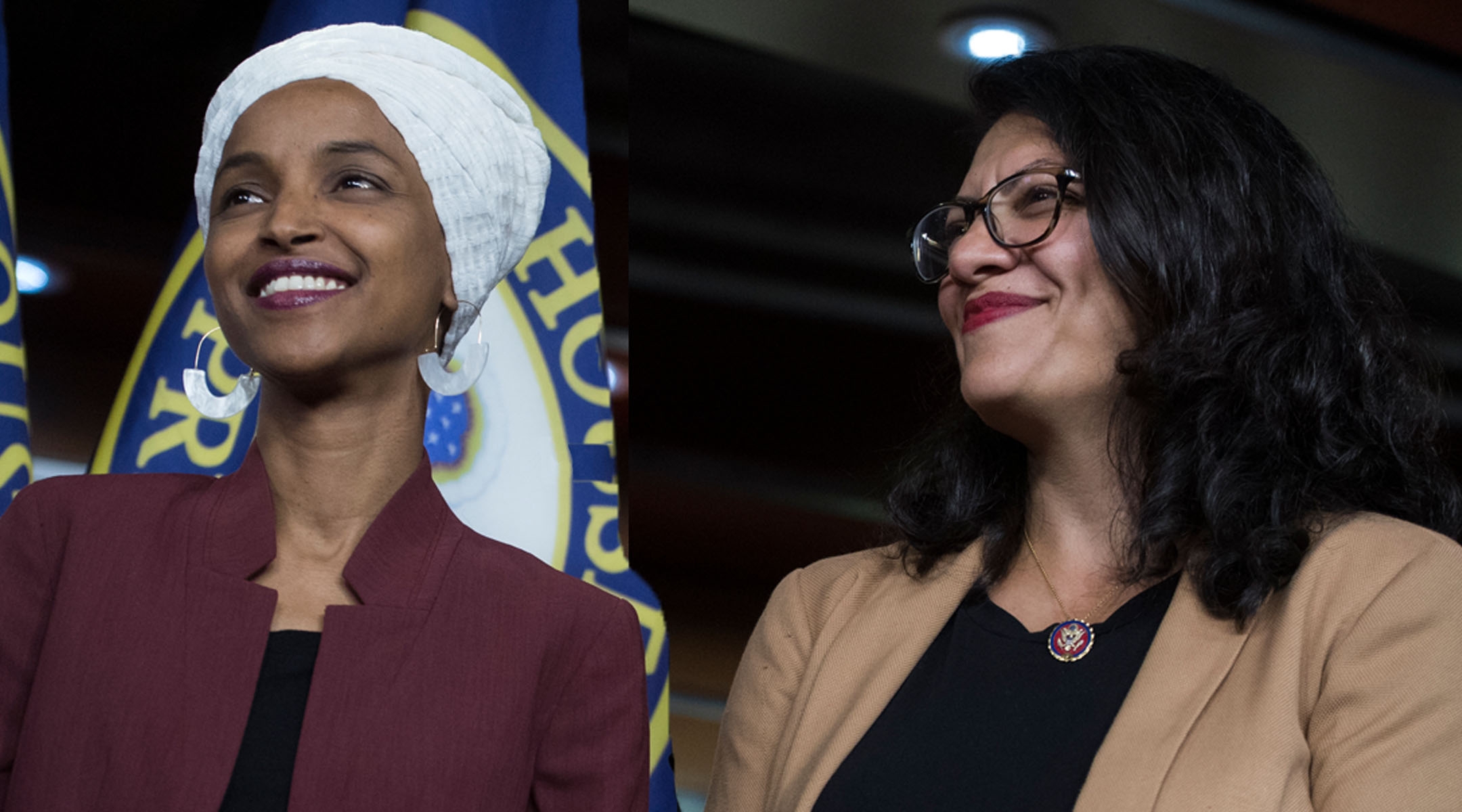
Reps. Ilhan Omar, left, and Rashida Tlaib were banned from entering Israel. (Tom Williams/CQ Roll Call)
Serious cracks appeared in what has long been a cherished feature of the U.S.-Israel relationship: bipartisanship.
In February, Rep. Ilhan Omar, D-Minn., came under fire for a series of controversial tweets, including one charging — falsely — that the American Israel Public Affairs Committee pays politicians to be pro-Israel. Omar drew quick rebukes from leading Democrats and subsequently apologized. The following month, President Trump piled on, calling the Democrats the “anti-Jewish” party. In August, he upped the ante, saying that anyone who voted for a Democrat was guilty of “disloyalty,” a comment that drew condemnation from critics who said it evoked classic anti-Semitic tropes.
Meanwhile, Israel denied entry to Omar and another freshman Muslim congresswoman, Rashida Tlaib, D-Mich. Both lawmakers are supporters of the Boycott, Divestment and Sanctions movement against Israel. Israel’s move drew an unusually broad array of criticism from American Jewish groups. The Anti-Defamation League, the American Jewish Committee, the Jewish Federations of North America and AIPAC — in a rare statement of criticism aimed at Israel — decried Israel’s action.
The #MeToo movement hits the Jewish community
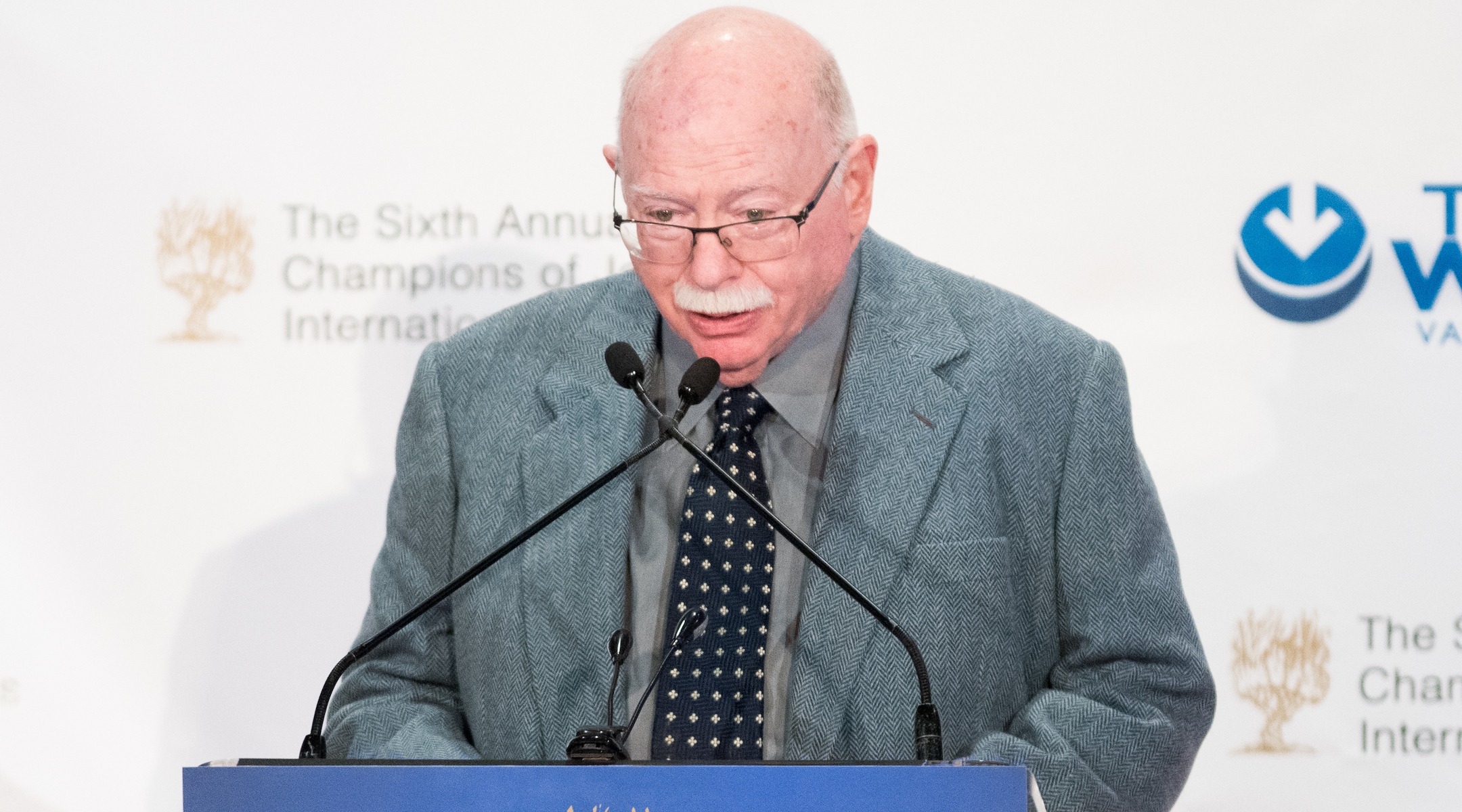
Michael Steinhardt speaks at the Champions of Jewish Values International Awards Gala in New York City, March 8, 2018. (Michael Brochstein/Getty Images)
Michael Steinhardt, the Jewish megadonor who helped found Birthright Israel and supports a wide range of Jewish institutions, was accused of a pattern of propositioning and sexually inappropriate remarks to women. According to an investigation by The New York Times and ProPublica, the journalism nonprofit, seven women alleged that Steinhardt made sexual requests of them while they were seeking his financial support. Steinhardt denied the accusations, but acknowledged a pattern of comments “that were boorish, disrespectful, and just plain dumb.”
In the wake of the accusations, the organized Jewish community’s longtime focus on encouraging endogamy and child rearing — long among Steinhardt’s favored philanthropic objectives — drew increasing scrutiny.
A measles outbreak hits the Orthodox community
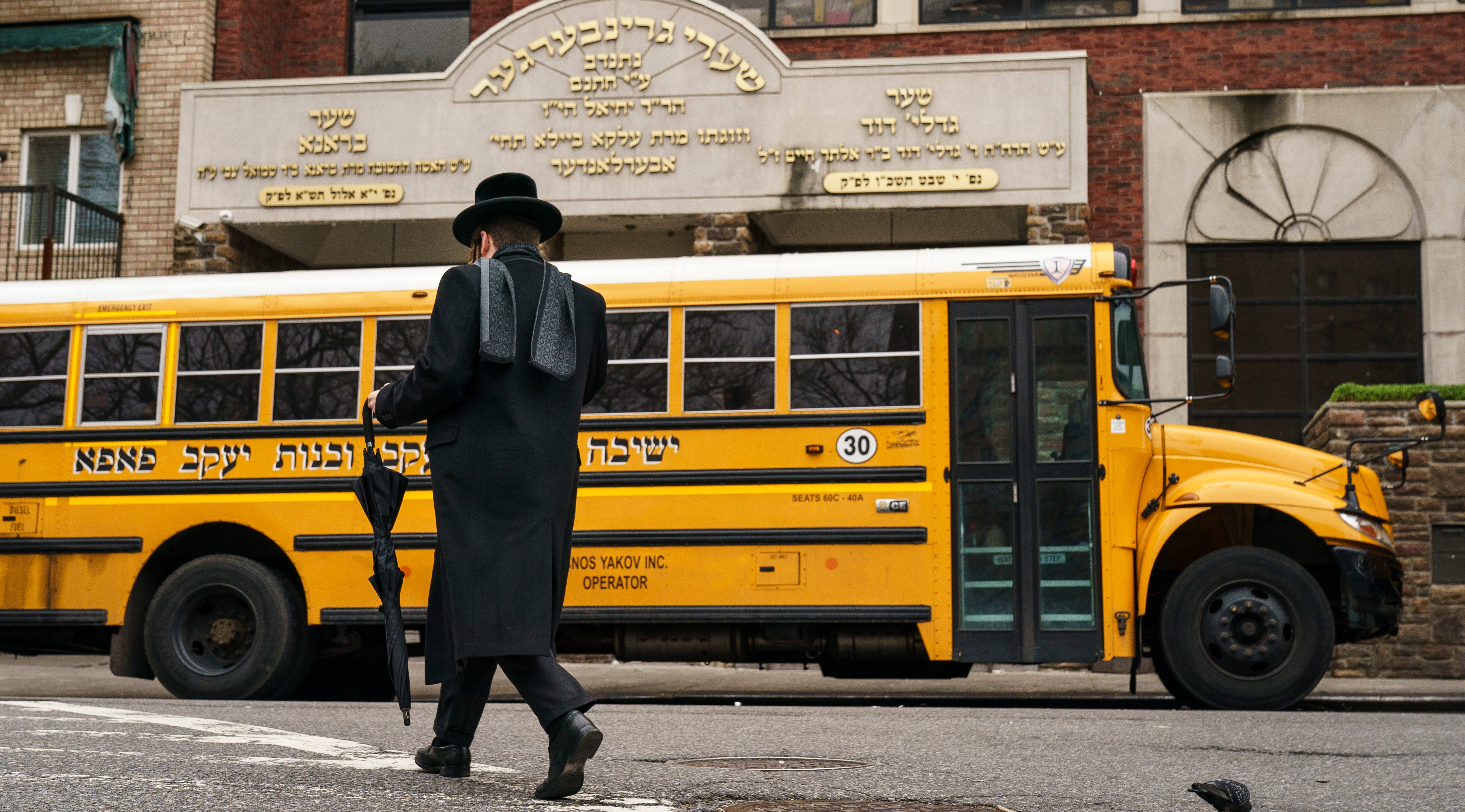
A man walks past the Yeshiva Kehilath Yakov School in the South Williamsburg neighborhood of Brooklyn, April 9, 2019. Proposed regulations would require all private schools, particularly yeshivas, to offer secular studies that are substantially equivalent to those offered in public schools. (Drew Angerer/Getty Images)
In November, the New York City Health Department said 17 cases of measles had been reported in Brooklyn’s Orthodox Jewish community. The problem was just beginning: By April, there were 285 reported cases, including 246 children. Other measles outbreaks were reported in nearby Orthodox communities, where vaccination rates against the disease are often low.
New York City Mayor Bill de Blasio responded by declaring a public health emergency and ordering unvaccinated people living in four heavily Orthodox Zip codes in Brooklyn to be vaccinated or pay fines up to $1,000. The city also closed a yeshiva preschool in the Williamsburg neighborhood for defying a Health Department order to provide medical and attendance records regarding measles vaccinations.
But hostility to vaccination still remained high in some Orthodox circles. In June, 200 people attended an anti-vaccination event in a Brooklyn basement and heard a speaker claim that vaccinations were part of a government conspiracy.
JTA has documented Jewish history in real-time for over a century. Keep our journalism strong by joining us in supporting independent, award-winning reporting.
